Methodology |
| International Tax Review opened the survey of international tax services in North America in January 2006. We encouraged consumers of international tax services in the region to provide their views by completing the online questionnaire. The survey closed on February 17 2006. We received 281 responses from heads of tax, chief financial officers and tax executives. Just over 77% were personally responsible for the selection and retention of their tax advisers. Most responses were from tax executives within the region (95%). The questionnaire asked respondents how much they spend on tax services, what tax services they outsource and how satisfied they were with the services they receive. It also asked them what their biggest challenge was and how tax services could be improved. Some of their responses are reproduced here. More than 79% of respondents provided information on their annual turnover and 86% revealed how much they spend on tax services each year. We then divided this into three groups according to how much they spend on tax services each year:
All currency references are in US dollars unless stated otherwise. |
More and more tax directors are finding it difficult to cope with the demands of the Sarbanes Oxley Act and other reporting requirements in North America. More than 22% of respondents to this year's survey of tax services in North America cited it as their number one concern. This is up from 18% last year.
Tax directors complained of a sharp increase in the demands made on their department but a woeful increase in the resources available to them. Many felt they were drowning under the extra compliance burden and disclosure requirements that are placed squarely on their shoulders.
The accounting for income tax changes in the US gave many some cause for concern. This issue leapt into the top ten challenges at number five. It did not rate at all in the top ten challenges last year.
Finding and retaining tax talent was another problem troubling tax directors in the region. More than 14% of respondents said that it was getting more difficult to hire and keep talented tax executives. They complained that they had to compete with the big four and other tax-service providers to hire the right people, putting pressure on their department's salary costs.
Another cost increase irritating tax directors is the cost and quality of international tax advice from advisers' foreign offices. Many feel that the standards of tax advice from these offices should be better and more coordinated. The cost of such services, particularly if they are not delivered in a coordinated way annoyed many tax directors.
Diagram 1: Survey respondents by sector |
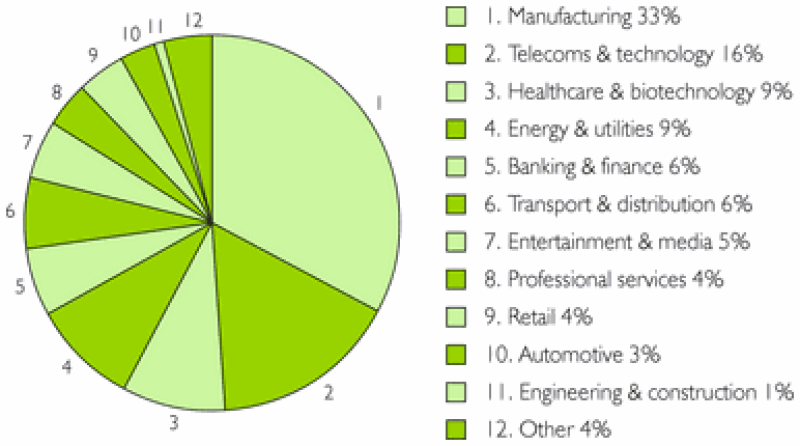
|
The best brands and key individuals |
The survey asked respondents the name of the firm that they thought has the best brand in tax services. The big four took the top places. Deloitte and Ernst & Young led the pack, followed by PricewaterhouseCoopers. Fewer respondents mentioned KPMG among the big four. Among the law firms, Baker & McKenzie as well as McDermott, Will & Emery received a high number of mentions. The survey asked respondents to name an individual that influenced their choice of firm. Respondents mentioned people that such as:
|
Big spenders shrink
The proportion of companies spending the most on external tax services shrunk in this year's survey. Those spending more than $2 million a year on tax services decreased from 21% to 15%.
This overall decrease is also reflected in the average spent on tax services when analyzed against company turnover as shown in table 1. In all categories, except companies with turnover of less than $1 million, the average amount spent on external tax services dropped.
Tax directors are finding they need to spend more of their tax budget on compliance, as diagram 3 shows. The big tax-services spenders forked out almost the same proportion as last year on compliance (25%). Other tax spenders allocated a significantly greater proportion of their budget to compliance (as opposed to planning or transactions) than they did a year ago.
Diagram 2: How much respondents spend on tax advice each year |
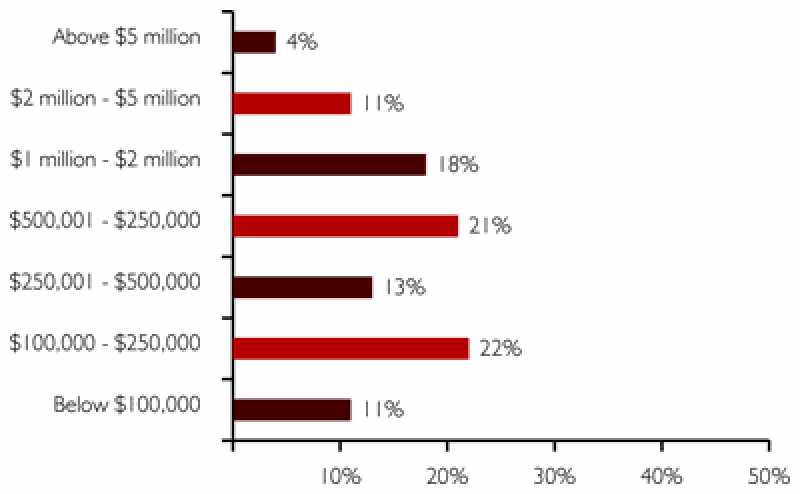
|
Diagram 3: Proportional average of outsourced tax services by tax spend |
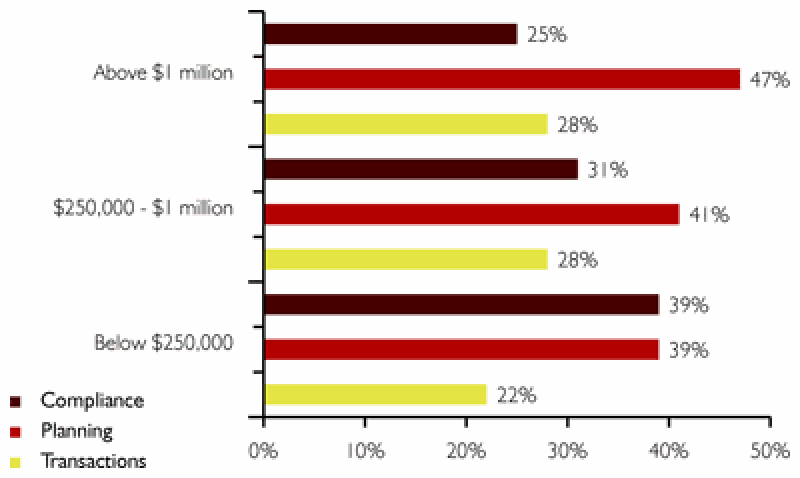
|
Sarbanes Oxley shifts
The proportion of companies that still receive tax advice from their auditor, which the Sarbanes Oxley Act made more difficult, has dropped from 57% last year to 39% this year. Two years ago it stood at almost 60%. Sarbanes Oxley has caused a dramatic shake-up of the tax and audit services market.
It seems however, that the shift of tax services from auditors is almost over. Within the group of respondents that continue to receive tax advice from their auditor, only 10% said that they planned to change this arrangement within the next 12 months.
Diagram 4: Third-party tax advice by firm type and tax spend |
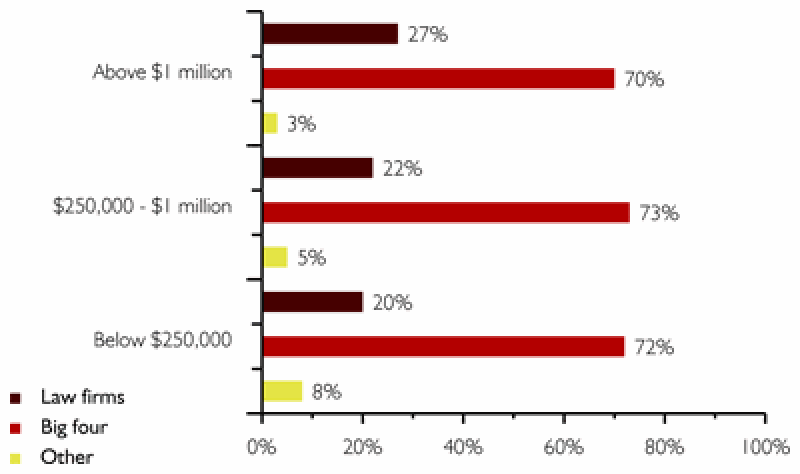
|
Diagram 5: Use of third-party advice by tax spend |
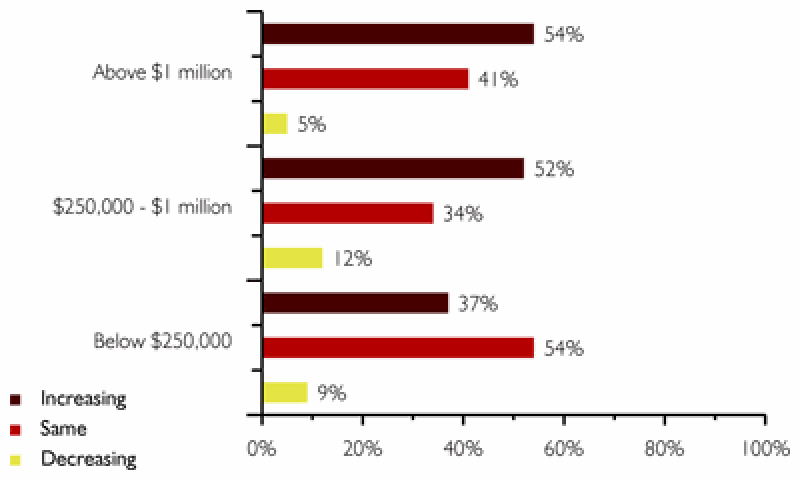
|
Top ten challenges facing tax executives in North America |
| The survey asked respondents to give the biggest challenge for someone in their role. They are:
|
Service satisfaction
The level of satisfaction with tax services is highest in New York with an average satisfaction rating of 1.88 (up from 1.72 last year). A score of 2 is 'very satisfied', a score of 1 is simply 'satisfied', while 'not satisfied' is zero.
Tax directors were happier with the services they receive, than they were a year ago, in Chicago, the San Francisco Bay Area and Canada. The satisfaction level dropped however in Washington, DC (from 1.70 to 1.59) and Los Angeles (from 1.57 to 1.50), which was the lowest-scoring region in North America.
Diagram 6: Why taxpayers choose their advisers |
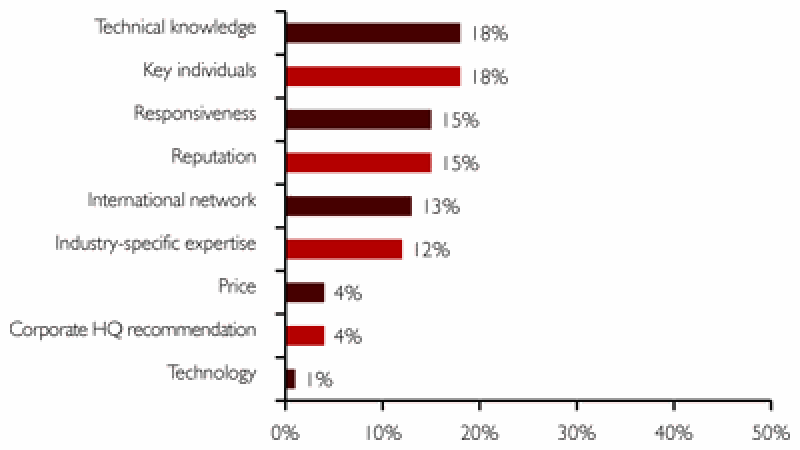
|
Diagram 7: How satisfied taxpayers are with tax advice by region |
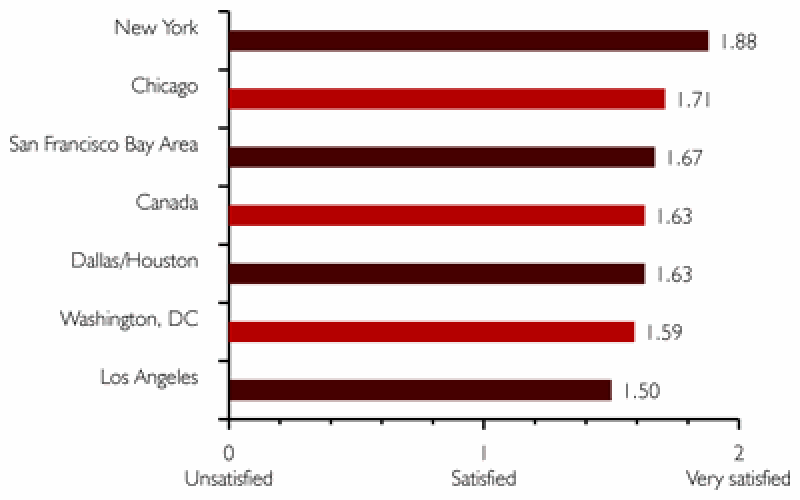
|
A bigger piece of pie
The big four professional services firms (Deloitte, Ernst & Young, Pricewaterhouse-Coopers and KPMG) took a bigger share of the tax-services pie this year. They boosted their market share from 62% to 70% overall. The law firms experienced a decrease in their market share, overall, from 34% last year to 25% this year. The third group, named 'other', inched their market share up a percent from last year to 5%. This group comprised mainly of second-tier accounting firms (including BDO, Grant Thornton & RSM), tax boutiques and transfer pricing consultants.
The sharp hike in reporting and compliance demands in the US has largely benefited the big four firms. Tax-risk management and corporate governance pressures are the key areas of market growth that most of the big four are successfully capitalizing on.
For the top-end of the tax services market, (those spending more than $1 million a year on tax services), the big four increased their market share from 68% last year to 70%.
Diagram 8: Respondents' annual turnover |
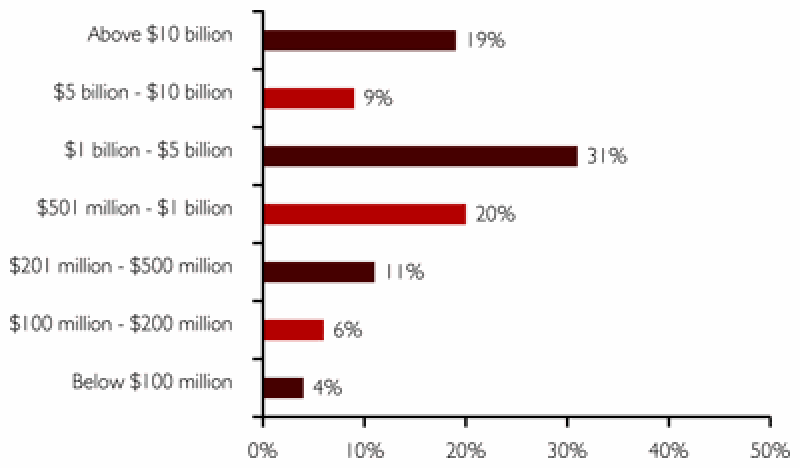
|
Diagram 9: Average proportion of tax services outsourced by sector |
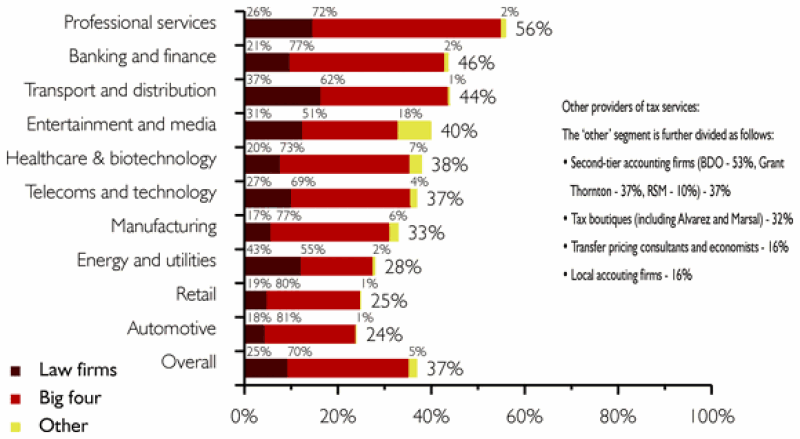
|
Frustration with costs
The number one way that tax directors thought that tax services could improve was to understand their client's business and industry better. The second-most-popular way for tax services to improve was faster response times and more proactive advice (20%), up from 12% last year.
There was more concern about the rising level of fees and as well as the degree of transparency and honesty in fee estimates. Many tax directors felt that their advisers were not upfront about the level of fees and thought that costs were getting out of control, particularly for service-provider's foreign offices.
Table 1: Company turnover by annual tax spend |
|
Annual turnover |
Average tax spend |
Above $10 billion |
$2,480,003 |
$5 billion-$10 billion |
$1,246,667 |
$1 billion-$5 billion |
$825,648 |
$501 million-$1 billion |
$442,086 |
$201 million-$500 million |
$430,250 |
$100 million-$200 million |
$248,000 |
Below $100 million |
$241,875 |
Table 2: Satisfaction with level of contact with tax advisers |
||
How often do you meet with outside advisers? |
||
2006 |
2005 |
|
Weekly |
12% |
18% |
Every second week |
11% |
16% |
Monthly |
27% |
27% |
Every 1-3 months |
36% |
25% |
Every 3-6 months |
8% |
6% |
Every 6-12 months |
6% |
8% |
How would you assess the level of contact with outside advisers? |
||
Poor |
1% |
1% |
Average |
14% |
10% |
Good |
31% |
32% |
Very good |
54% |
57% |
How often do you review your use of firms? |
||
Every six months |
22% |
26% |
Once a year |
54% |
54% |
Every two years |
21% |
19% |
Every five years |
3% |
2% |
Risk appetite and fewer bodies
A new theme in this year's responses on how tax services could improve was tax-risk appetite. Tax directors wanted their advisers to better understand their appetite for risk in tax planning. They complained of tax-product selling pressure rather than getting to know a client's business and industry profile first to see whether it is appropriate, let alone desirable given the variance in tax-risk tolerance.
Complaints about staff turnover increased in this year's survey. A number of tax directors felt that their tax advisers either inadequately staffed or over-staffed (or both) their work. Generally they wanted fewer bodies on their account, and they wanted a higher skill level with better technical knowledge from the people on their account. Tax directors also felt that they did not have an adequate level of access to the partner in charge of their account.
The biggest challenge for selected respondents |
"The biggest challenge is the ever-increasing reporting requirements." |
- Pamela Abbott, tax director, Roswell, GE |
Boral Industries |
|
"FAS 109 and Sarbanes 404 are the biggest challenges." |
- Ronald Bouchard, vice president - taxes, Westlake Village, CA |
Dole Food |
|
"Getting service providers to respond to our specific needs without focusing so much on their own fee maximization is the biggest challenge." |
- Jim Beck, treasurer, Seattle, WA |
Attachmate |
|
"Global integration, tax compliance internationally and global regulations are the biggest challenges." |
- Carlos Caraveo, finance vice-president, Houston, TX |
PMI Holdings North America |
|
"Keeping the staff energized and interested in what they do and preventingturnover of experienced good staff." |
- Larisa Love, director of tax, New York, NY |
Foot Locker |
|
"Compliance with regulations is the biggest challenge." |
- Oliver Bracken, director, New York, NY |
Sony Corp of America |
|
"Risk identification and mitigation" |
- Kenneth Sweeney, vice president tax, San Jose, CA |
eBay |
|
"Recruitment and retention of tax talent in-house and by external advisers is the biggest challenge." |
- Dawn Stengel, director - tax reporting, Edmonton, Canada |
Enbridge |
|
"Compliance with Sarbanes Oxley and transfer pricing rules around the world." |
- Marie-Andree Chevalier, tax manager, Montreal, Canada |
Autodesk |
|
"Keeping up with tax law changes is the biggest challenge." |
- Carolina Picazo, tax director, Menlo Park, US |
Spectrum Equity Investors |
Changes ahead
Tax directors in North America have increasing pressures on them and their teams. They face increasing internal demands, a greater compliance and reporting burden and fewer resources to play with.
The surprising dip in overall tax services expenditure is not likely last long. More than half of respondents from companies that spend more than $250,000 a year on tax said that their use of third-party tax advice was increasing. If trends continue, most of this new tax advice expenditure will relate to compliance that will be snapped up by the big four professional services firms. They have positioned themselves nicely.
Tax directors are not stupid people. They obviously need to be well aware of the legislative changes and trends in the tax services market. While Sarbanes has been a boon for tax service providers generally it is folly for tax advisers to be anything less than completely upfront and honest with their clients. Thomas Kelly, director of tax and treasury at manufacturer Pall in New York, said: "Stop using Sarbanes as leverage!"
How tax advice can improve – selected respondents |
"Give a reasonable turnaround on projects as well as a central point of contact for the global network." |
- Jay Wells, global vice-president of tax, Denver, CO |
Molson Coors Brewing |
|
"Be perfect on the details of services and advice. Perfection and low cost is demanded by our customers and I expect it from our advisers." |
- Caleb Standafer, director of tax, Los Angeles, CA |
Teledyne Technologies |
|
"Targeting projects and ideas versus blanket fishing expeditions. One size does not fit all." |
- Daniel Russo, director of taxes - aerospace, Savannah, GE |
Gulfstream Aerospace |
|
"Ask me how I am evaluated!" |
- Andrew Beck, senior tax manager, Warrendale, PA |
American Eagle Outfitters |
|
"Provide direct access to experts." |
- Dean Reynolds, vice-president tax, Phoenix, AZ |
PetSmart |
|
"Stop selling and focus on issues specific to the company. Stop losing good employees - too much turnover. It takes a long time for new people to become accustomed to operations. Stop using Sarbanes as leverage." |
- Thomas Kelly, director of tax and treasury, East Hills, NY |
Pall |
|
"Be insanely responsive!" |
- Mark Pfluger, international tax consultant, Neenah, WI |
Kimberly Clark |
|
"Say something other than: 'They're your workpapers. I can't tell you what's right. I can only tell you if they are wrong.'" |
- Eric Schultheis, director of tax compliance, Kennett Square, PA |
Genesis Healthcare |
|
"Draw on various offices' resources and expertise on international tax issues." |
- Karen Wong, manager - corporate tax, Calgary, Canada |
TransAlta |
|
"More industry-specific ideas please." |
- Joe Greco, vice-president tax, Bedminster, NJ |
Verizon Wireless |
|
"Understand our business." |
- Bill Sample, vice president - worldwide income tax, Redmond, WA |
Microsoft |
Top ten ways tax advice needs to improve |
| The survey asked how tax services could improve. They are:
|
Directory









